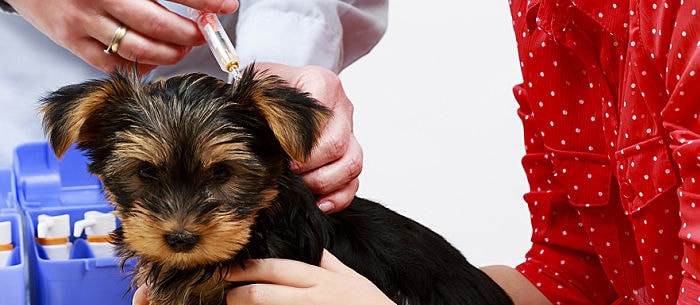When you have a new puppy to cuddle, love, and take care of, you’ve got your hands full! There’s so much to do that you might worry you’ll slip up on making sure your pup receives all her necessary puppy shots on schedule. But doing so is vital to keeping your precious little ball of fur healthy and happy.
“Vaccines have the greatest impact on pets’ well-being, allowing us to prevent diseases previously devastating to them,” says veterinarian Dr. Duffy Jones of Peachtree Hills Animal Hospital in Atlanta. So make sure to keep up with those shots!
You might also worry that while you are waiting for your pup to receive his first shots, your unvaccinated puppy could catch something — and you’re right! However, dog expert Sarah Wilson, co-author of “Dogology,” says it’s not necessary to keep your unvaccinated puppy completely isolated. Just choose social interactions wisely. “Don’t let your dog walker take the new puppy just yet,” she advises. While socializing in a large group is great for dogs, she admits, it is “simply not the place for a puppy not fully vaccinated.”
To keep your puppy fully protected, the American Society for the Prevention of Cruelty to Animals (ASPCA) recommends following a vaccination schedule like this one:
- Six Weeks
At six to seven weeks of age, your puppy should receive the first of four combination vaccines that protect against highly contagious and serious viral diseases, including hepatitis, distemper, parvovirus, coronavirus and parainfluenza. This combo vaccine helps your precious pup avoid multiple rounds of shots by getting them all in one swoop. If you have concerns about your puppy getting a combination vaccine, talk to your vet about the possibility of receiving them one at a time.
- Nine Weeks
A few weeks following the first set of shots (described above), your puppy should receive the second round of hepatitis, distemper, parvovirus, coronavirus and parainfluenza, given in combination as before. If your puppy received the vaccinations separately, ask your veterinarian whether you will need to space out individual puppy shots differently than the combo shot.
- 12 Weeks
At 12 weeks of age, your puppy will have the third round of hepatitis, distemper, parvovirus, coronavirus and parainfluenza.
- 14 to 16 Weeks
At around 14 to 16 weeks, your puppy should receive a vaccine for rabies. People who live around areas with a lot of squirrels, chipmunks or raccoons should always make sure to vaccinate their pets against rabies. Just one bite from an infected animal could pass rabies to your dog. Your dog could then pass this disease on to your entire family, so it’s vital to vaccinate against this dangerous infection.
- 16 Weeks
At 16 weeks of age, your puppy will have the last combination vaccine for hepatitis, distemper, parvovirus, coronavirus and parainfluenza. After receiving this final combo vaccine, you can rest assured that your furry friend will stay protected from these diseases.
You might also talk to your veterinarian about additional puppy shots, which are optional, including a vaccination for Lyme disease. The Lyme disease vaccination helps protect your puppy from contracting Lyme disease from infected ticks. It’s especially important to get this vaccination if you plan to allow your dog to hang outdoors for any length of time.
If you think you might have trouble remembering when to take your puppy in to the vet, write the vaccination schedule on your calendar to help you keep track. Also keep a folder handy (in your desk or on your computer) for filing vet reports and receipts so you’ll have a record of your pet’s health history and care all in one place.
For more on dog health, check out How to Protect Your Pet From Fleas and Ticks.
Kelly Sundstrom is an award-winning journalist, author, artist and national special needs spokesperson. As the caretaker of two dogs, five cats and a bearded dragon, Sundstrom knows the importance of keeping pets up to date on their vaccinations.


